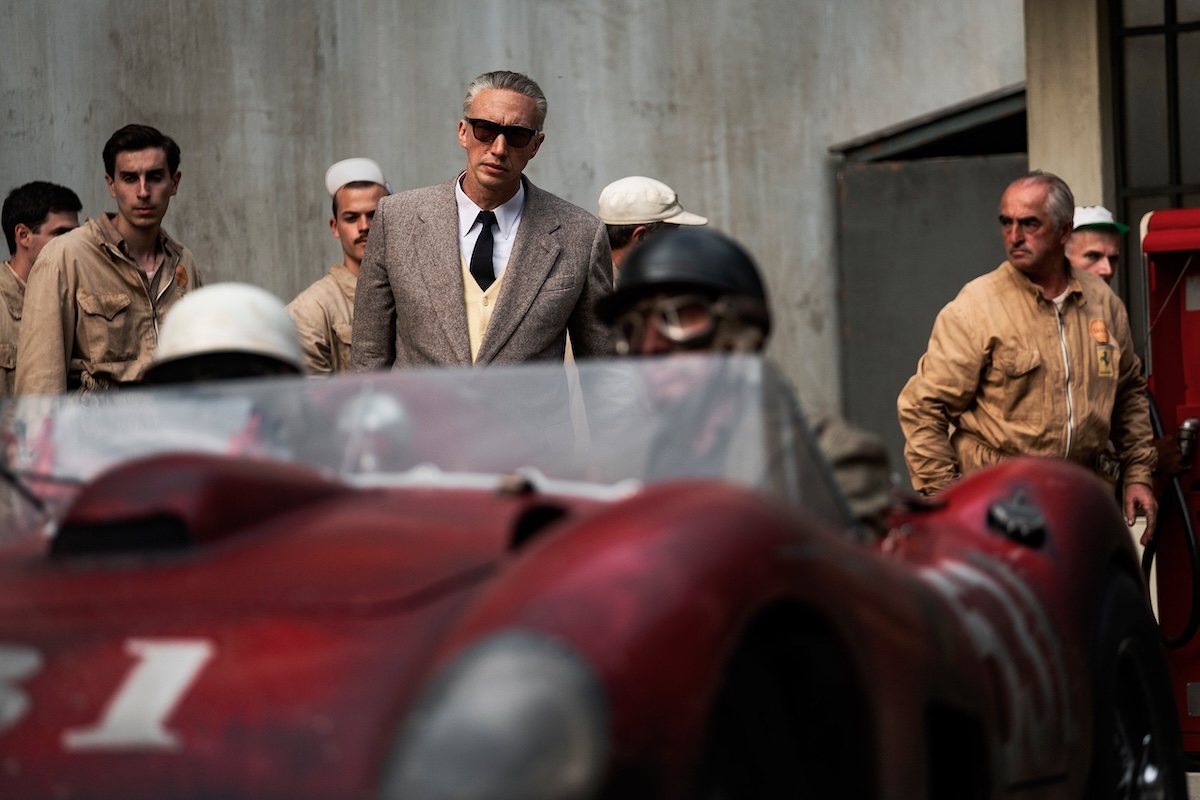Michael Mann is famous for crime dramas like Thief (1981), Heat (1995), and Collateral (2004) that suggest that only criminals can be free, since the rest of us are constantly bossed around. There is something of the Old Left as well as Romanticism in Mann’s attitude, and both elements of his artistic vision are foreign to our entertainment, just as his protagonists are marginal figures in our society. Most of his movies, moreover, are studies of men who are really good at getting what they want, and ours is a time when successful men are rejected, so Mann seems almost reactionary.
Now 80, Mann has turned to a strikingly different theme with Ferrari, that of the founder and the necessary sacrifices of a successful founding, a Machiavellian theme for which he naturally turned to Italy. His Enzo Ferrari (Adam Driver in a somewhat comical performance) is a ruler about to lose his enterprise and who therefore must make a number of deadly decisions. The year is 1957 and Ferrari is losing money because it’s not producing enough cars and losing races because the drivers are merely human and the cars already too fast and so powerful that any hesitation, or mechanical failure, or surprise on the road can cause death.
Death is an important part of the movie, therefore. Enzo builds cars his friends die driving; the drivers are by 1957 too young to be his friends, yet he must let them die, indeed compete for the privilege. The young men are beautiful and that somehow attracts them to danger just as surely as it attracts beautiful women to them—that’s where power and freedom lie. Enzo is a rationalist compared to them, but they share a desire to take control of life, to exercise their every power to conquer fortune.
Enzo’s son Dino has died young, of muscular dystrophy, in 1956, which seems to have ruined his marriage with Laura (Penélope Cruz). She’s still in mourning a year later and seems like she speaks for the dead who blame Enzo. But she is also his ruthless partner in the business; she also willingly sacrifices her interests to save Ferrari; and she still has enough pride to accept no consolation but to carry on alone. The role would have earned Cruz an Oscar, but it is no longer politically acceptable for a woman to define herself in relation to a man.
Enzo dedicated his engineering power to saving his son Dino’s life, but he failed. Now he visits his grave and talks to him. Enzo cannot talk to the living, since there is always danger there. He cannot look at the price paid for the things he wants; it seems his wife Laura, who built the company with him, paid that price and deals with the ugliness and pain that are the lot of human beings. The man has an easier path in that sense. Enzo is honored in his native Modena, where his rival is Maserati and the local priest compares the metalworkers of Modena to the carpenter Jesus. Enzo also has another son with another woman (Shailene Woodley), so that he has both an heir and the domestic life that keeps him sane.
Ferrari is about the preparations for the Mille Miglia (Thousand Miles) race in the summer of 1957 and culminates in a beautiful, long sequence re-creating that race. Racers started in Brescia in the evening, one by one at minute intervals (all the way to dawn), drove south to Rome, then returned, and the best time won. The race took 10–11 hours to complete, and 1957 was the last time it was run. Victory in this race would prepare a new global fame for Ferrari, leading to more orders of cars that in turn would lead to a good deal with the giants of automotive capitalism, in this case the Italian carmaker Fiat. Mann dramatizes the business but insists on the beauty of the cars and the madness of racing. He mixes together the beauty of the Italian landscape, the sublime and deadly mountains, the cities where bales of hay in the piazzas limit the damage cars might do, and the narrow medieval streets.
Of course, people are not only rewarded with beauty and excitement, watching the cars go by, or reading the accounts in the press. The endurance races transform the unique abilities of the drivers into a judgment on how reliable the car would be for the ordinary driver over a long period of time. There is Rationalism and Progress concealed in the beauty, but it is a curious science that seems to make the excellent redundant and reassure the mediocre, turning danger into safety.
There is a scene in which Enzo explains the principles of engines to his bastard Piero. It made me think that most drivers nowadays have no better understanding about engines than that child. Ferrari might be a movie for the young men who love cars, but would they care about the past, the family drama that dominates the first half of the movie? In that scene, Enzo talks like an engineer, appealing to the boy’s common sense as much as to his interest, and bringing him to the conclusion that beauty is natural, a sign that things work and that they are strong. But what is the connection between the experience of the driver and the thinking the engineer does? Perhaps love of victory, and that’s surely the most important passion in a man’s heart when it comes to politics. Enzo is a founder, and Ferrari is an enterprise that aims to guide much more than driving by the pursuit of beauty and excellence, and Mann’s movie suggests that our way of life is built on this difficulty with putting men and women together, engineering and marriage. This is accordingly a very ambitious story, both modern and human.

